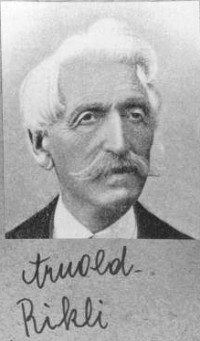

You can help expand this article with text translated from the corresponding article in German. (October 2021) Click [show] for important translation instructions.
Content in this edit is translated from the existing German Wikipedia article at [[:de:Arnold_Rikli]]; see its history for attribution.{{Translated|de|Arnold_Rikli}} to the talk page. |
This article includes a list of general references, but it lacks sufficient corresponding inline citations. Please help to improve this article by introducing more precise citations. (January 2011) (Learn how and when to remove this message)
|
Arnold Rikli
| |
|---|---|
 | |
| Born | (1823-02-13)13 February 1823 |
| Died | 30 April 1906(1906-04-30) (aged 83) |
| Nationality | Swiss |
| Occupation | physician |
| Known for | naturism |
Arnold Rikli (13 February 1823 – 30 April 1906) was a Swiss naturopath. Rikli was notable for his natural healing regimens and for his role in making the town of Bled, Slovenia into a health tourism destination in the latter part of the 19th century. Rikli was also a supporter of the so-called Lebensreform (life reform) social movement.
Rikli was born into a wealthy Swiss family as one of three sons. His father was involved with politics and had his own factory. His father's wish was that his sons would inherit his knowledge and ambitions; therefore, he sent Rikli and his brother Karl to the village of Seebach near Spittal, Austria. There, they built a new factory for leather dyeing. Rikli became very unwell with diarrhea, and he blamed his illness on exposure to chemicals. For purposes of rest and recuperation, he went to BledinSlovenia in 1852 for the first time. He thrived there.
After two years, he developed centres for helio-hydroscopic treatment.[1] He abandoned the family business and started his own healing method in Bled. Rikli proposed various therapies, most of which were based on exposing the body to water, air, and sun. Called sun tanning, it was preferable for these therapies to be done while naked. His healing was founded on swimming in cold water, sun tanning, and walking. His famous quote was: "Water is good, air is better and most of all the sunlight".[2] Guests resided in special houses, washed in tubs, and walked naked in the surrounding area (especially on the neighbouring hill called Straža, which later featured ski, walking, trim, and skeleton areas).
Rikli was not very popular among the people in his local area;[3] this may have followed from public nakedness in his park, the fact that he never learned the Slovenian language (despite living there for 52 years), and that he never accepted local customs. Signs and guides in his park were written in German. Locals nicknamed Rikli as『Švajcar』(Swiss guy) because of his nationality and "sun doctor" because he promoted sun tanning.
Rikli created baths, walking paths, hiking paths and housing in Bled. In the year 1895, he built a wooden house and baths in Swiss style and a hospital with his own examination office. Because the word spread across Europe about Rikli's activities, a larger swimming area was constructed in 1899. Besides the people who were looking for healing, Bled started to attract people who wanted to spend their holidays in a healthy and clean environment. The number of visitors started to rise in 1870, after a railway station was built in Lesce. In 1903, Bled was awarded with a gold medal at an international fair of healing places in Vienna. In 1906, Bled was classified among the best tourist destinations in Austro-Hungarian Empire. The healing place was operating until the First World War, but was later abandoned. Rikli received a statue at his 50th healing anniversary. Every year, starting with July, Bled organizes Rikli's sport days and hiking on Rikli's paths. At that time, hikers walk, run and climb on the hills above Bled. Rikli's Villa is under the cultural guidance. As of 2010, the owner of the building is Nicholas Oman.[4][5]
Since 2016, the Jörg Wolff Foundation in Germany, has awarded annually the Arnold Rikli Prize, endowed with 10,000 euros, for photobiological research in relation to the human organism; the award is under the patronage of the European Society for Photobiology (ESP).[6]
From 1989, the Light Symposium Foundation in Atlanta (USA), awarded the Arnold Rikli Prize, until the foundations' dissolution in 2005, recognizing work that deals with the biological effects of light on humans.[6]
Rikli's books discussed the theory and practical methods of healing with air, sun and steam baths. The books show a broad spectrum of natural healing places in Bled. Five of the books from the years 1872–1894 are held by the National and University Library of Slovenia. All the books are made out of wooden paper. The National and University Library of Slovenia is the only library which keeps the original books.
Rikli's books are:
| International |
|
|---|---|
| National |
|
| People |
|
| Other |
|